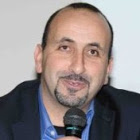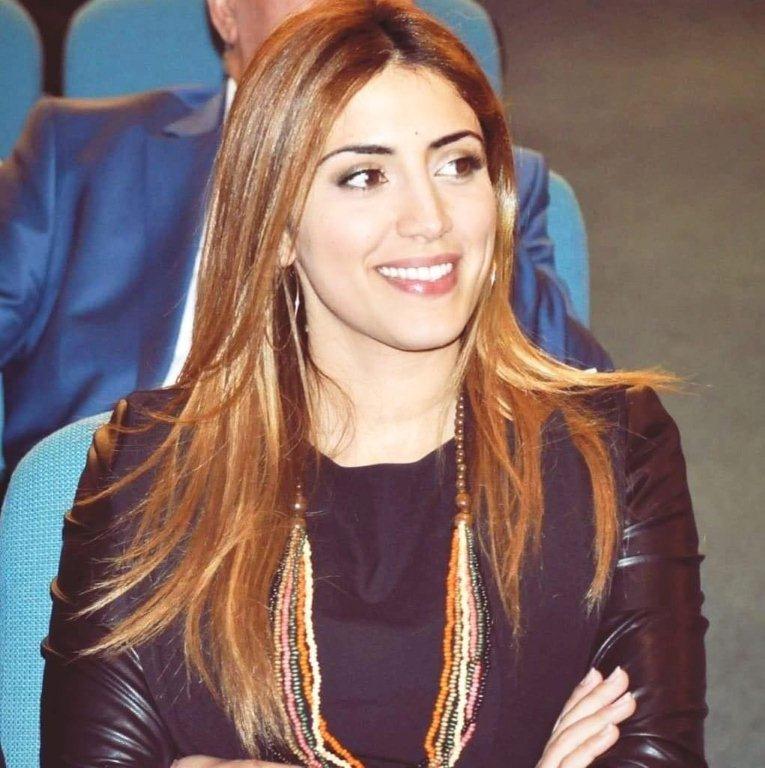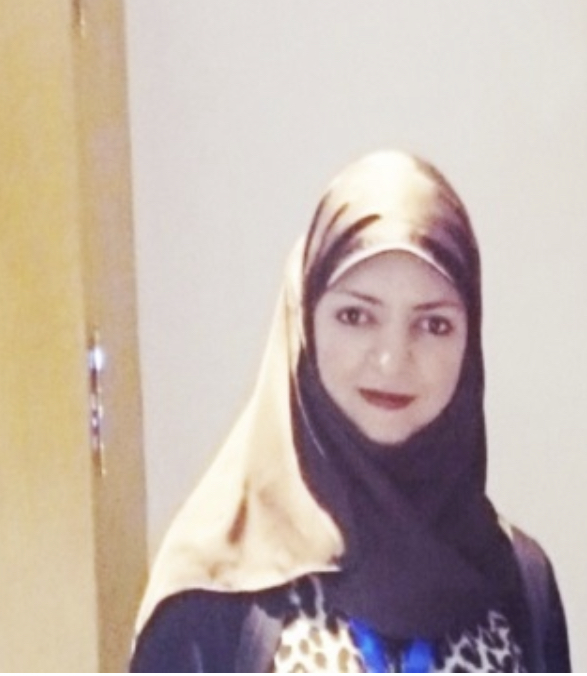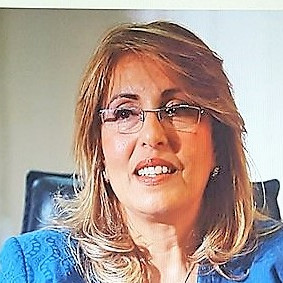Speakers And Facilitators
Ivana Smucker, Director of Programs, HANDS, USA

Ivana Veselinovic-Smucker is the Director of Programs at Hands Along the Nile (HANDS), a U.S. based non-profit organization. With more than 20 years of experience in international development and non-profit management gained through professional engagements in the Balkans, Middle East and the U.S., Ms. Smucker has been at the forefront of developing and growing a number of programs and strategies aimed at effectively facilitating the economic and social development in Egypt and the region, while creating strong partnerships and fostering intercultural understanding and cooperation between the U.S. and the Middle East and North Africa. As Director of Programs, Ms. Smucker oversees the existing and initiates new programs and partnerships to empower marginalized communities and groups (particularly women, the disabled and youth) through projects on the ground, as well as through various professional exchange programs between the US and the MENA region countries (Morocco, Tunisia and Egypt). Ms. Smucker holds Master’s Degree in Public Administration from George Mason University in Virginia. She is the Project Director for “Activating the Private Sector for Women’s Economic Rights in Egypt, Morocco and Tunisia”, sponsored by the UNDEF, under which this conference is taking place.
Margrit Sourafim, Director for Local Development, CEOSS, Egypt

Margrit Saroufim has been with CEOSS since 1990, and as Director for Local Development, is involved in various aspects of CEOSS’s organizational work, holding a leadership role in planning, development strategies, program design, team leadership, and project management at the macro level. She works with around 120 full-time staff, in delivering CEOSS’s local, national and international actors and partners comprehensive and sustainable development programs and strategies. Her work aims to build resilient communities, groups, individuals, and local CSOs, as well as combat poverty and improve the quality of life for poor and marginalized people. CEOSS’s long-term goal is to achieve sustainable, equitable and inclusive development, with a special focus on vulnerable women and young girls, children at risk, unemployed youth, small farmers, people with disabilities, and those who live in impoverished and disconnected communities. Margrit holds a Bachelors of Agricultural Science and has educational experiences with the Social Research Center, American University in Cairo, Sussex University in Brighton, England, and Reading University in Reading, England. With more than thirty years of development experience, Margrit has attended and spoken at numerous conferences with organizations including the ACLCA Federation in Benin, Ghana and Nigeria, The Foundation for the Support of Women in Ankara, Turkey, The National NGO Commission for Population and Development (NCPD), and the World Bank.
Dr. Soukaina Bouraoui, Executive Director, CAWTAR, Tunisia

Dr. Bouraoui is a founding member of the International Forum of Mediterranean Women (1992), which actively fosters dialogue between Arab women and EuroMediterranean women and promotes networking among different social groups as key to sustainable development. Since 1999, Dr. Bouraoui has been Executive Director of the Center of Arab Women for Training and Research (CAWTAR), a regional organization established in 1993 and based in Tunisia. The mandate of CAWTAR is to promote the status and role of women in development in the Arab region. Dr. Bouraoui has taught as a professor of law in the Legal, Political and Social Studies Department at the University of Tunis, having obtained a doctoral degree in law in 1982. Dr. Bouraoui was head of the Department of Civil Law & Criminal Sciences from 1987 to 1991. During that time she introduced the “Environment Diploma”, covering an area of interest in which she had long worked before obtaining a doctorate with a particular focus on development and urban planning. Her areas of expertise are criminal law, civil law, environmental law, human rights, gender justice and globalization. Dr. Bouraoui has authored international scholarly publications on the environment, economic law, citizenship and women’s rights and has been a visiting professor at various international universities. She is a member of the Board of the Tunisian Association of Criminal Law, the International Association of Economic Law “AIDE” and Vice President of the International Center of Comparative Environmental Law “CIDCE”, as well as a Board of Advisor member at International Development Law Organization “IDLO”. In 1997, she was elected a Regional Governor of the International Environment Council. Since 2000, she has been a member of the International Court of Environment Arbitration and Conciliation (ICEAC). Dr. Bouraoui founded and directed for six years (1991- 1997) the Tunisian Centre for Information, Documentation, Studies and Research on Women (CREDIF). She also took the role of Chairman of the Women’s Development Plan Committee for the Eighth Tunisian National Economic and Social Development Plan.
Zakia Mrini, President, Association Ennakhil, Morocco

Zakia Mrini is the President of Association Ennakhil and has been serving her term as a member of the Moroccan Parliament since 2016. Born in Marrakech, Zakia holds two doctorates from universities and state in Geology (one from France in 1985 and from Morocco in 1993). She participates and collaborates with various actors at national and international level, focusing on women’s rights and local development. During her professional career, she has held and currently holds key positions, namely: founding President of Ennakhil Association, University Professor of Geology at the Faculty of Sciences Semlalia of Marrakech since 1985, Parliamentarian with the party modernity and authenticity, President of the Committee on the Interior of Parliament (2016-2019), President of the PAM Regional Council Marrakech Safi, currently a member of the PAM Regional Council and National Council, elected from the Arrondissement Guéliz-Marrakech (2015), President of the Guéliz-Marrakech Arrondissement (2009), President of the Moroccan Institute for Local Development (IMADEL) (2008), founder of the listening center (Hawwâa) for women and girl victims of violence in the region of Marrakech (1999), elected to the city council of Marrakech in 2003-2009, founder of the national network for the integration of women in development in Morocco (2001), founder of the national network “Spring of equality” for the change of the family code in Morocco (2002), founder of the movement of the third of the seats for women towards parity (2006), founder of the Moroccan Association of Local Elections (AMEL) (2007), and is a consultant in the field of social gender, the operation of listening centers, women’s political participation in Morocco and local management.
Dr. Hoda Yassa, Head of Arab Women Investors Union, Egypt

Dr. Hoda Yassa is an entrepreneur in petrochemical industries and has initiated ventures in various industrial and business sectors. Her greatest achievement is establishing the Arab Women Investors Union, affiliated with the Arab League. The union was the portal for many investments in Egypt and the Arab World that are accomplished through the joint ventures of different Arab businesswomen. After building her own successful businesses in the Arab world, Dr. Yassa founded the Union to strengthen mutual investments and economic relations between Arab countries.
Barbara Langley, Director, Center for International Private Enterprise (CIPE)’s Center for Women’s Economic Empowerment, USA

Barbara Langley serves as Director for CIPE’s Center for Women’s Economic Empowerment, democratizing opportunity for women by fostering ecosystems for entrepreneurship. She leads CIPE’s strategy to amplify the voice of the private sector through women’s equal participation in free markets and democratic institutions. Throughout her career, Ms. Langley has conducted campaign management, communications, coalition building, issues advocacy, good governance and accountability, leadership and strategic planning programs for democratic political and civic activists, business leaders, local elected officials and parliamentary and campaign staff. She has worked extensively with marginalized sectors of society including women, youth, and persons with disabilities. Prior to her position with CIPE, she has held positions with the International Republican Institute (IRI) around the globe, and served in the Administration of President George W. Bush as Confidential Assistant in the Office of the Director of the U.S. Peace Corps.
Dr. Nadia Zrelli Ben Hamida, Associate Professor, Institute of Advanced Commercial Studies, Chair of the Tunisia Leadership Council for the Policy Circle, Tunisia

Nadia Zrelli Ben Hamida is an assistant professor in economics at the Institute of Higher Commercial Studies of Sousse. She’s a World Bank Consultant on PPP’s project, Chair of The Tunisian Leadership Council for The Policy Circle and former consultant at the Ministry of Major National Projects, Tunisian Presidency of The Government. She is a senior researcher at DEFI as well as a member of the think tank ARDES and the MEEA. Her main scientific research themes are the school to work transition, the unemployment of the higher education graduates, and the evaluation of higher educational systems, overeducation, gender disparities, entrepreneurship, economic growth, Islamic finance and inequality. She is an author of several scientific papers and the book “Evaluation of Higher Educational Systems”. She is at the head of implementation for the project Business, Innovation and Development for Entrepreneurial Youth Awards (BIDEYA) and the Executive Master’s degree in public policies to the ministry of the scientific higher education and scientific research. Within the framework of the PPP, she participated in the implementation of the project Open Start-up with Columbia University. She is an expert at Novation City for the implementation of a program Novation Business Accelerator. Additionally, she’s a scholar of the We Lead Program of the Bush Institute in Dallas, Texas. She created Tunisia Entrepreneurship Association to set up challenges in the institutions of the University of Sousse.
Dr. Ragui Assaad, Economist and Professor of Planning and Public Affairs, University of Minnesota Humphrey School of Public Affairs, Egypt

Ragui Assaad is a Professor at the Humphrey School of Public Affairs in the University of Minnesota, where he co-chairs the Master of Development Practice Program. He has been an ERF research fellow since 1994 and serves as a member of its Board of Trustees. He is also a member of the Board of Trustees of the Arab Council for the Social Sciences and a non-resident senior fellow at the Center for Labor Economics (IZA) in Bonn, Germany. Dr. Assaad’s current research focuses on labor markets in the Arab World, with a focus on youth and gender issues as they relate to education, transition from school-to-work, employment and unemployment, informality, migration, and family formation.
Dr. Sabah Chraibi, National President, Espod Association, Morocco

Sabah Chraibi is the President of the Association for the Promotion of Women Entrepreneurship (ESPOD), and a humanist and activist with a background in the associative, academic and entrepreneurial spheres. Since obtaining her State Doctorate in Public Law and Political Science from Hassan II University of Casablanca in 1993, Dr. Chraibi has held numerous professorships in both Europe and Africa and is an expert in Maghreb-Europe relations. Dr. Chraibi is also a Member of the Board of Directors of the International Center for Mediation and Arbitration in Rabat (CIMAR), member of the Moroccan Court of Mediation and Arbitration of Casablanca, has served as Municipal Councilor in Casablanca, and is a member of several international and cultural organizations. On top of this, she has supplied consultation and workshops for organizations such as UNICEF, USAID, and the United Nations Economic Commission for Africa. She is the author of several articles, conferences and trainings on the issues of rights, the economy, sustainable development, gender, social cohesion and more.
Leila Belkihiria Jaber, President, National Chamber of Women Entrepreneurs, Tunisian Union of Industry, Commerce, and Crafts, Expert in Female Entrepreneurship, Tunisia

A member of the Executive Board of CNFCE from 2002 to 2012 and member of Executive Board of COMFWB (COMESA Federation of Women In Business), Ms Belkhiria has been the president of CNFCE since 2017. She holds a bachelor’s degree in marketing from lSG in Tunis, a Postgraduate degree in International Trade Law from “Faculté des Sciences Juridiques Tunis II”, and an MBA in Communication & Leadership from Dale Carnegie Training. She is the CEO and co-founder of the group STELFAIR TUNISIA operating in the sector of ICT since 1996. As Vice-President of CNFCE from 2012-2017, Leila participated in the development of strategies for gender-equal opportunities, women entrepreneurship development, the increase of women’s access to decision-making positions, the establishment of the Businesswomen’s Academy, and the elaboration of the manifest “Unleashing female entrepreneurship in Tunisia.” Moreover, she established the Businesswomen’s Academy. She held the title of Female entrepreneur of the year in the ICT sector in 2015, of Female entrepreneur of the year in 2008, and of Women of The Decade in Business & Leadership in 2019. The President of the Republic of Tunisia as “Commander of the Republic” decorated her in 2019.
Eman Wahby, General Partner, Grow in Africa Fund (GIAF), Egypt

Eman Wahby has 20 years of professional experience in international development with the World Bank and is experienced in working with governments, civil society, youth groups, private sector, donors and multilateral organizations. She has also worked as Operations Officer with the World Bank Group’s Senior Vice President, engaged in Asia (Korea, Japan, China and Singapore) and sustainable finance community in Switzerland, and has been a supporter for the fundraising of SDGs Partnership Fund in East Asia and GCC. She holds a BA and MA from the American University in Cairo and is a fellow of UK’s Hansard Society.
Hassan Aladlouni, Consultant for social entrepreneurship and women’s empowerment, Morocco

Hassan Aladlouni received his MBA in 1998. Since then, he has accumulated extensive work experience in both the U.S. and Morocco in the banking, IT, automotive, hospitality and non-profit sectors. Hassan served as Country Director of the High Atlas Foundation, Country Director for CorpsAfrica/Maroc, and General Manager of Amal Women’s Training Center. In 2015, Hassan was selected by the U.S. Department of State to participate in the Professional Fellows Program for NGO managers. He is currently a consultant for social entrepreneurship and women’s empowerment. He is married and has two daughters and a son.
Aalia Ghouli, Head of Marketing, Strategy, Innovation and Digital, Diversity Champion, ECCOM Member, Morocco

A graduate of Paris Dauphine University and ESSEC business school in France, Aalia Ghouli has more than 20 years of experience holding various positions of responsibility within the Moroccan and African Financial sectors. Before joining BMCI Bank in 2008, she held a management position at PriceWaterhouseCoopers and was Head of Mission at the Moroccan Central Bank. Since then, she has held several positions at BMCI Bank, including that of Inspector General covering Morocco and other countries of Africa. She set up, in June 2018, the Marketing, Innovation, Digital and Strategy Department in BMCI Bank, and has conducted several independent consultancies in the continent for the IMF. On top of her current responsibilities, she is a committed champion of diversity as Business Manager for Gender Diversity who aims to unlock growth for businesses and people by creating positive disruption and inclusive, diverse and open environments.
Mrs. Myriam Garram, Head of External Financing, International Relations Department, Amen Bank, Tunisia

Myriam holds an MBA in Financial services from UQAM (University of Quebec at Montreal) and a diploma in advanced studies from the Higher School of Economic and Commercial Sciences of Tunis. Currently, she is Head of the External Financing Department at the Finance & Strategy Department of Amen Bank.
Ghada Shamandy Hamed, Gender Mainstreaming Coordinator, Railway Authority, Egypt

Ghada Shamandi Hamed holds a BA in Civil Engineering from Ain Shams University in Egypt and a Diploma in Engineering Project Management. She was accepted into the Egyptian Engineers Syndicate in 2010. Ghada specializes in engineering projects management and works in international project management “projects funded by international finance institutions such as the World Bank and the EBRD” at the Egyptian Ministry of Transport – Egyptian National Railways “ENR” for ten years. She is now the ENR Gender focal point and Senior Projects Engineer.
Sana Ghnima, Founder and CEO, Sanabil Med and Finland Leaders School, Tunisia

Sana Ghnima is a Business Development Specialist offering 25 years of experience in entrepreneurship, converting sales leads, capitalizing on emerging opportunities and effectively managing multiple activities fields and territories. She holds a high level of expertise in service and program development with National and regional implementation plans, and is a strong advocate for running efficient, targeted, inclusive and cost-effective development programs that improve the lives of the people served. As an export Trade Professional with leadership experience and an in-depth knowledge of international markets and regulation and an entrepreneur and general manager with over 20 years of successful experience in Innovation and development, she has seen tremendous success in IT and Industry. Her expertise has founded her reputation as a consultant and allowed her to conduct trainings, coaching and mentoring, benefitting the leadership of companies and organizations at the local, regional, and international level. She is the founder and CEO of Sanabil Med, a digital publishing house created in 2004 in Tunisia, that develops digital projects and education contents. Sanabil Med’s mission is to create and shape the educational and cultural content in an inclusive approach by controlling new technologies for learning.
Jackie Kameel, Executive Director, Nahdet El-Mahrousa, Egypt

Jackie Kameel is a development practitioner, specializing in bottom-up approaches to sustainable development in Egypt. Jackie is the Managing Director of Nahdet El Mahrousa (NM), an Egyptian youth-led NGO, which incubates and supports early stage social enterprises working to solve Egypt’s toughest development problems. Jackie helped build NM from a small startup organization into one of Egypt’s leading civil society organizations working in areas of social entrepreneurship, employment, and youth empowerment. NM and its incubated social enterprises impact the lives of more than 50,000 beneficiaries every year.
Dr. Hala Barakat, Director, Center for Entrepreneurship and Innovation, AUC School of Business, Egypt

Hala Barakat graduated from the American University in Cairo in 1998 with a bachelor’s degree in Business Administration and a minor in Economics. From there, she head-started her career in international banking and finance, later shifting to production and retail. Being an entrepreneur herself, she was directly involved in the peaks and valleys of the business world, which enabled her to guide and mentor young entrepreneurs in different fields. In 2016, Barakat obtained her master’s degree in Economics in International Development from the American University in Cairo. Post-completion, she began providing education-for-employment training, as well as workshops in entrepreneurship and other related fields. Not long after, she became certain that her longstanding interest in education and entrepreneurship development had heightened into an eternal passion to support and impact the ecosystem.
Abir Leheta, Chairman and CEO, Egytrans, Egypt

Abir Leheta has served as Egytrans’s chairman and CEO since 2015. Outside of her roles with Egytrans, Ms. Leheta also serves on the board of the Egyptian Transportation and Logistics Co and ScanArabia Shipping Agencies. After she obtained a bachelor of Computer Science with a Minor in Business Administration from the American University in Cairo, she worked in software development and IT management, working her way up from entry-level to an executive position. In 2016, Ms. Leheta was named as one of the top 50 most influential women in the Egyptian economy by Amwal Al Ghad.
Fathia Bennis, Chairperson, Maroclear, President, Women’s Tribune, Morocco

Fathia Bennis is a pronounced leader in North African Finance. After securing an apprenticeship at Bank Al-Maghreb, Ms. Bennis worked hard to master her knowledge of the economic system and finance, leading to her promotion within the field. After her 17 years with the bank, she was called to direct the Casablanca Stock Exchange as Managing Director, which she led for 3 years. She was appointed as Director General of the Moroccan National Tourist Office (ONMT), where she worked until she was called to head Maroclear, the central securities depository in Morocco. Ms. Bennis is a founding member of the Association of Women Entrepreneurs in Morocco (AFEM), treasurer of the Moroccan Association for the Study of International Relations, Deputy Secretary General of the Royal Moroccan Federation of Golf, treasurer of the Rabat Emergency Aid Association, and president and co-founder of the Women’s Tribune Association.
Amel Ben Farhat, President, Association of Women Engineers, Tunisia

A graduate of the National School of Engineers of Tunis, Amel Ben Farhat is currently General Manager of the Technical Center of Mechanical and Electrical Industries – CETIME and President of the Tunisian Association of Women Engineers. Her specialties include design and implementation of technical cooperation projects for the benefit of SMEs, including project management and evaluation and Management consulting, as well as Support to the public sector through consulting in quality infrastructure development, conformity assessment, standardization, certification, quality, upgrading, and restructuring. She has 29 years of experience in supporting Small Market Enterprises in various institutions under the responsibility of the Ministry of Industry. She has held numerous positions in the field, including Director General of the National Institute for Standardization and Industrial Property, INNORPI, member of the board of the World Organization for Standardization, ISO, member of the strategy committee at ISO, vice president of the African Organization for Standardization, ORAN, and National Manager of the Competitiveness Support Program and the Facilitation of Market Access, PCAM from 2012 to 2016. In addition, she has 10 years of experience in technical cooperation programs with the European Union and Japan to support SMEs and has been a consultant in the industrial field and a short-term expert in Arab and African countries mandated by the Islamic bank, ISO / Devco in quality infrastructure. She specializes in private sector support and SME development strategies as well as quality infrastructure development. She started her career in the fields of standardization and certification of industrial products and systems, total quality management, at INNORPI.
Dr. Maha Ismail, CEO, Cairo Center for Development Benchmarking, Egypt

As the CEO of Cairo Center for Development Benchmarking, Maha is responsible for running all facets of the business. She is heavily experienced in executive management and over 20 years of experience driving research management in the Development industry in topics related to public finance, labor market, education, poverty, social policies, ICT and manufacture. Prior to joining CDB, she served as Undersecretary and the Technical Office Manager at the Egyptian Cabinet of Ministries, Egypt. Previously, she has worked as a Monitoring and Evaluation Expert running evaluations for the government public policies, services and projects. Dr. Ismail earned her Ph.D. degree of the Euro-Mediterranean Studies from Cairo University, along with a Master of Public Administration from Mohammed Bin Rashed School of Government in a joint program with Harvard University and a Diploma of Decision Support Systems on Economic modeling and Advanced statistics.
Fatma Mselmi, CEO, Laur’us Consulting, Tunisia

Fatma Mselmi has a master’s degree in strategic management and over 12 years of management experience with EU institutions and monitoring of complex consulting projects. With the German Cooperation for development (GIZ), she worked as an innovation expert and responsible for a delegated cooperation with the European Union with a budget of 700.000 Euros during 2014. She also worked on women’s economic development and developed strategies, as well as managed and supervised their implementations in partnership with Tunisian Ministries and the European Union.
Nadia Bennouna, Senior Consultant, Axafric, Morocco

After her constructive experience focused on new products management and marketing within large Moroccan firms, Nadia Bennouna has worked as a Senior Consultant for the past 15 years. Nadia is an expert in research and market studies, innovative strategies and action plans implementation, and has worked with many companies and non-governmental organizations. Aware of the major societal and environmental challenges that threaten us and driven by an urgent need to act, Nadia has always been involved in community programs that relate to women’s empowerment and leadership, corporate social responsibility and sustainable development. Graduated with focuses on business management and institutional development, she combines her professional and associative experience as an active member of Moroccan Association working for women’s economic inclusion through skills development and support of income-generating projects. Nadia understands the specificities and constraints of both the Moroccan entrepreneurial and associative environment.
Rim Aljabi, Tunisia

Rim Aljabi has been working on Gender and Development issues since 1994, when she attended a 10 weeks TOT Gender and Development Program at the University of East Anglia (UEA), UK. In 2005, she obtained a Master (MA) in Gender Analysis in Development at UEA. Ever since, she has been a trainer, consultant, researcher, director and manager with different international and regional organizations including: United Nation Development Program (UNDP), International Labour Organization (ILO), Center for Arab Women Training and Research (CAWTAR), International Development Law Organization (IDLO), United Nation Economic and Social Commission for West Asia (ESCWA), World Bank, and UN Women. Her experience took her from Syria to Lebanon, Jordan, Tunisia, Egypt, Turkey, Sudan, Yemen, and Afghanistan. Rim contributed to a number of papers and researches on gender and development including: Gender and Trade in Lebanon (SIDA/CAWTAR 2018); Gender and Trade for the Agadir Trade Agreement (2018); Promoting women empowerment for Inclusive and Sustainable industrial Development in the MENA region (UNIDO/CAWTAR 2015); The Gender Mainstreaming Strategies toolkit (ILO, Egypt 2015); Women’s Labour Related Legislations and Laws in the MENA Region (OXFAM/CAWTAR 2013); Inventory on Women Enterprise Development in MENA (OECD/CAWTAR 2013); Gender Dimension in Poverty Measures and Analysis in Jordan; (UNDP 2012) Introducing Gender Mainstreaming in Trade and Economy: Toolkit (UNDP 2007); Gender and Economic Laws in the MENA Region (IDLO, Cairo).
Facilitators
Nada Diouri, Women empowerment and education specialist, Morocco

Nada graduated from the Institut Supérieur de Commerce et d’Administration des Entreprises in Casablanca (ISCAE) and holds a Master’s degree in International Relations from Laval University and McGill University in Canada. Nada is involved in projects for the empowerment of young people in precarious situations by introducing them to green jobs through the optimization of waste management. She is a specialist in education, youth economic empowerment and gender. She has held several positions and conducted several consulting missions within various national and international organizations. She has been appointed a member of the strategic board of the Millennium Challenge Corporation.
Ms. Razan Al-Hosban, Senior Counsel Egypt & Levant (Jordan, Lebanon & Palestinian Authority Area), Philip Morris, Egypt

Razan Al-Hosban received a BA in Law in Jordan and LLM in England. She was admitted to the Jordan Bar Association with 10 years of practice, including private practice and in-house. Razan specializes in corporate, commercial, competition, taxation, and M&A with regional experience, including GCC, Egypt, Jordan, Lebanon and West Bank. She is also an ambassador for the world’s biggest and most impactful youth leadership summit (One Young World). Currently, Razan is working at Philip Morris International in Egypt.
Zakaria Fahim, President of BDO, President of Hub Africa and Union des Auto Entrepreneurs, Morocco

Zakaria Fahim is the founder and president of Hub Africa, the premier platform for investors and entrepreneurs in Africa. With Hub Africa, he has initiated a collection of e-Learning modules on economic intelligence at the service of African Small and Medium Enterprises (SMEs). Mr. Fahim is also the president of BDO Sarl, the 5th largest audit and consulting network in the world and a leader in advising entrepreneurial companies. At BDO Sarl, Mr. Fahim specializes in Mergers and Acquisition and Information Security. In the past, he has held numerous positions in government and private sector accountability and small enterprise advocacy.
Ilham Boujlid, Entrepreneur, Morocco

Ilham Boujlid is the Associate Manager at Job2vente and is a specialist in training and recruitment with strong abilities in the production of digital educational content E-Learning and educational videos. Ilham Boujlid worked for nearly 12 years in the distribution business to develop numerous organized retail networks and has supported many companies in the deployment of action plans aimed at improving the commercial performance of their employees through training and field sales coaching.
Partner Organizations
Coptic Evangelical Organization for Social Services (CEOSS)
Coptic Evangelical Organization for Social Services (CEOSS) is one of the largest and oldest Egyptian NGOs and one of the leading organizations in raising the capacity of Egyptian civil society to improve women’s economic and political participation. CEOSS’ programs to empower women include literacy training projects, life-skills training, leadership training, FGM eradication campaigns, and integrating women from informal sector into formal. CEOSS is a member and an umbrella organization of several networks dedicated to protecting and promoting rights of women in Egyptian society.
Center of Arab Women for Training and Research (CAWTAR)
The Center of Arab Women for Training and Research (CAWTAR), based in Tunisia, was founded in 1993 and is committed to empowering women to achieve gender equality. CAWTAR is one of the few regional research and training institutions focused solely on women and development. Their network and programs span twenty-two Arab states, including a strong partnership with CEOSS in Egypt. CAWTAR focuses on three main areas: economic, political, and socio-cultural empowerment of women, women in water resources management, and policies and mechanisms to improve women’s status in the Arab world.
Association Ennakhil
Association Ennakhil (Association Ennakhil pour la femme et l’enfant) from Morocco is an organization conducting multiple programs to improve the lives of women since 1997 and have good administrative capacity as well as access to quality participants from this country. Their director is also a member of Parliament in Morocco. They have been a HANDS partner on three US-government-funded programs.

